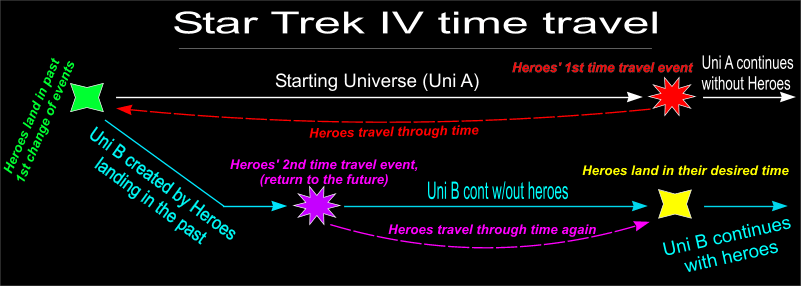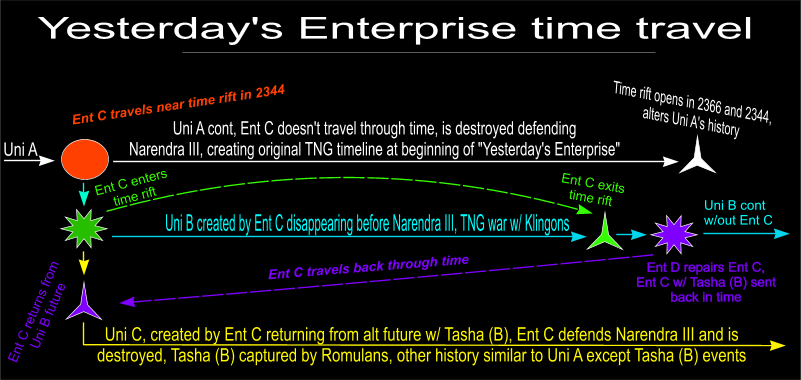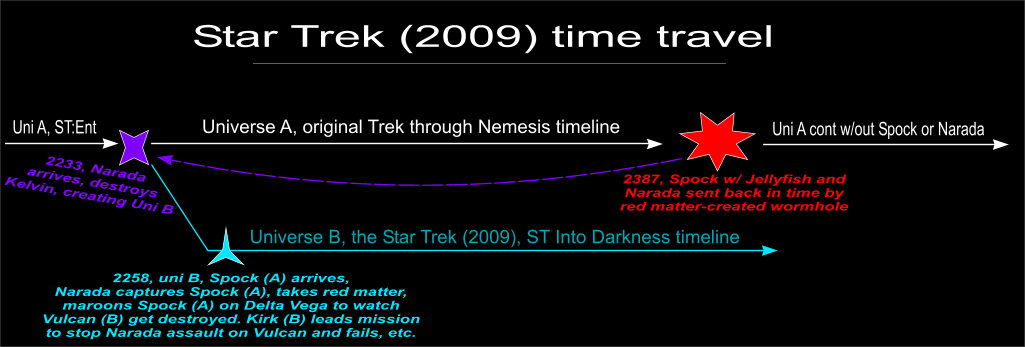I have to pick and choose when forced. I mean, Kirk's middle name comes from ST:TAS, and some of Spock's established background comes from TAS, but some of TAS is really difficult to justify as canon even before Roddenberry said it was out, like M'Ress and Arex on the bridge crew, or "The Magicks of Megas-Tu". So I guess overall I say "yes" and just try to close my eyes to the more out-there stuff like pink Klingons.Shock wrote:Hey, I have another question for you guys: Do you consider the animated Trek series to be canon?
I'm not misunderstanding anything, the Futurama episode "The Farnsworth Parabox" is describing stuff like Star Trek's "Mirror Mirror" universes, where everything is always different. "Parallels" argues something else, it says "For any event there is an infinite number of possible outcomes. Our choices determines which outcomes will follow. But there is a theory in quantum physics that all possibilities that can happen, do happen, in alternate quantum realities." So every action creates a new universe, you have the "turn left" universe and the "turn right" universe for every choice made, "all possibilities that can happen, do happen", the TURN LEFT universe and the TURN RIGHT universe are each separate quantum realities, creating an infinite number of parallel universes.Sparky Prime wrote:You're misunderstanding the difference here... By the Many-Worlds Interpretation, and what Data says in "Parallels", those universes already exist in their own separate quantum realities based on any possible choices made to any given event. That episode isn't arguing changes to a timeline at all, because there is no time travel involved. Take the Futurama episode where the Professor makes a box with a universe inside of it for example. They found out it was essentially the same as their universe, although the difference between their universes is that coin flips yielded the opposite result. That's essentially what "Parallels" is saying, every decision we could make exists as a new quantum reality, not that each change to a timeline causes a new quantum reality.
Alternate timelines ARE alternate universes, especially in Trek where "Parallels" confirms that theory. Back to the Future doesn't subscribe to it, but Trek does because our current understanding of quantum mechanics suggests that's may really be possible.The chalkboard scene was about alternate timelines, not alternate universes. Doc never once says they've created a parallel universe, only an alternate timeline. In fact, as he's drawing it on the chalkboard he says: "Imagine that this line represents time... Here's the present, 1985, the future, and the past. Prior to this point in time...(pointing to 1985) somewhere in the past, the timeline skewed into this tangent, creating an alternate 1985." The timeline skewed into an alternate timeline, it didn't create an alternate universe.Do you remember the chalkboard scene from Back to the Future 2? Any time travel-altered timeline is going to be the same thing, Yesterday's Enterprise starts with universe A, the ship is ripped out of time which creates universe B, and then the ship is sent backwards in time with repairs and Tasha Yar, creating a THIRD universe.
But it's not restored, she's not "made a part of the original timeline", that is a new event which creates a 3rd timeline... I'll try to give a visual explanation, but as you said, Yesterday's Enterprise is quite complicated..."Yesterday's Enterprise" is a bit more complicated. The alternate timeline of the Enterprise C traveling forward in time resulted in a Tasha Yar that wasn't killed, Timeline B. The timeline was restored to timeline A by the Enterprise C returning where it was supposed to be. However, the alternate Tasha was then made a part of the original timeline having went with the Enterprise C, essentially making a duplicate of her in the timeline.
Star Trek IV's timeline and how it creates alternate universes:

ST:TNG Yesterday's Enterprise timeline (forgive compact nature, I hadn't considered just widening the chalkboard) and its 3 alternate universes:

And New Coke Trek (2009)'s timeline and how it creates an alternate universe:

The producers are arguing that their Trek universe is akin to "Universe B" of Yesterday's Enterprise, and nobody has yet gone back in time and changed it to something else.
My previous point about it being dependent on perspective is that ST4, Yesterday's Enterprise and New Coke Trek have the audience follow the main characters without showing the alternate timelines they left, while Parallels follows only Worf so the rest of the main characters are changed with every parallel universe he jumps into, and those parallel universes are all created by alternate timelines.
You're mistaken, if there's to be something that looks like a temporal paradox existing, it must be from an alternate quantum reality or else it would negate itself - that's what makes it a paradox, and thus impossible. Back to the Future doesn't subscribe to this, hence Marty's incursion into the past begins erasing his own self, but Star Trek does subscribe to branching timelines creating alternate universes, Parallels, New Coke Trek, ST4, they all make this argument by having the main characters make changes to the past without affecting themselves, and while Yesterday's Enterprise doesn't SEEM to, it actually does because Tasha (B universe) enters our main characters' "normal" universe without being an impossible temporal paradox.No, a paradox can't be explained by parallel quantum realities because that is an entirely different concept. A paradox exists because of contradictions in a single altered timeline, not between parallel universes. You're not understanding the differences between the two concepts here.
If Marty McFly's trip into the past erases his future, then he cannot be in the future to take a trip into the past to erase himself, THAT is a paradox, it's logically impossible, so it cannot be. Back to the Future doesn't attempt to answer this riddle because it's trying to be a simple, straightforward piece of self-contained entertainment and nothing more.
Actually, it does. The universe they return to has small changes (unless the Guardian fixed them and didn't mention it, but why would he not just fix McCoy's errs then?), someone's clothes are stolen by Kirk & Spock, a policeman now has a story about being knocked unconscious by a man who looked like the devil, Keeler's soup kitchen has 2 less meals to give out to the hungry that day, the soup kitchen does not have need to offer others the job of cleaning so someone may have gone poorer, several stores have their stocks of electronic equipment diminished, a homeless man steals McCoy's phaser and vaporizes himself rather than live to do whatever else he was going to, all these little things DO affect the timeline even if in small ways, they're all changes however minor, and that altered timeline is a parallel universe.TOS: "The City on the Edge of Forever" - McCoy travels to the past using the Guardian of Forever, and inadvertently causes a change to the timeline where the Nazi's win WWII and the Federation never came into existence. The landing party in the 'present' is protected from the changes to the timeline, supposedly because of the Guardian itself, but the Enterprise no longer exists. So naturally they have no other option but to follow McCoy into the past and correct the timeline. No parallel universe is created here.
The alternative that you're suggesting is that they return to their original timeline, yet those little changes now take place. That leaves 2 conclusions possible, either Kirk, Spock, and McCoy were always destined to change the past in these ways and time is cyclical and immutable - which Trek clearly says isn't the case in other time-travel stories - or they return to a timeline that is both the same and not the same, which is a paradox that cannot exist. Logic says that a paradox cannot exist, it simply cannot be, that is what defines it as a paradox, so Trek extrapolates on an existing theory in current Quantum Mechanics that explains paradoxes away via branching alternate parallel universes.
